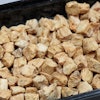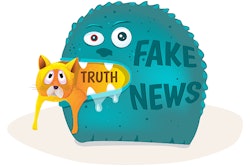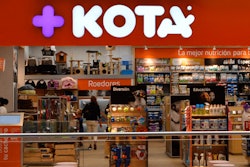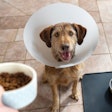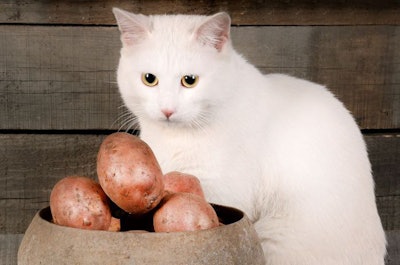
This article was first published February 2021.
As vegetarian and vegan diets become increasingly mainstream, pet owners want their companion animal’s diets to match their own edibility ethics. For dogs, evolved to vacuum up human left-overs, this isn’t as much of a problem. Cats require more caution. In nature and the margins of human habitation, cats eat other animals or the pieces thereof. However, cat digestive systems can handle plant-based nutrients, allowing the inclusion of grains, fruits and vegetables in cat kibble and wet food into properly formulated cat foods. Some animal nutritionists have raised concerns as vegetarian and vegan diets for cats have grown in popularity. To address this, Dr. Sarah Dodd, of the University of Guelph, conducted a survey of 1,325 cat owners, published in BMC Veterinary Research in 2021. Of those, 65% fed their cats a meat-based diet, while 18.2% fed a plant-based cat food. The cat owners reported their own observations of their cats’ health.
“The study suggests that pet parents feeding plant-based diets to cats do not perceive any adverse health outcomes, and that cats maintained (for an undetermined period of time) on plant-based diets have comparable longevity to cats maintained on conventional meat-based diets…” Dodd said. “Given a lack of evidence of adverse health effects throughout the literature, it may be time more companies consider offering a plant-based diet as part of their lineup, depending on how that fits with the company's marketing and philosophy.”
In some measures, plant-based diet cats had fewer reported health issues, such as gastrointestinal and hepatic disorders. Likewise, those owners reported higher ideal body condition scores than those of cats fed a meat-based diet. Overall, more owners of cats fed plant-based diets reported very good health scores for their feline.
“The limitations of a voluntary survey-based study must be considered when interpreting the results,” she said. “This study does not definitively demonstrate, for example, that cats fed plant-based diets enjoy better GI and hepatic health,” she said. “Further research is required to measure outcomes more objectively, but this is a promising start to guide future investigation and development.”
Cat owner cognitive biases in reported cat health
Cat owner’s observations may prove to be biased towards their own preconceived notions. Dodd structured her survey to avoid biasing people towards being a booster for their particular diet philosophy.
“Pet diet can be a very emotional subject for people to think, speak, and answer questions about,” she said. “For this survey, the question of diet was left to the very end of the survey (and respondents could not back track through the questions) to try to avoid the bias that could be induced by a subconscious desire to 'defend' a particular feeding practice. That said, there could be a general bias that a pet parent feels regardless of whether they have been asked about diet or not. I would assume that this would bias away from the null, as I would expect that owners feeding unconventional diets likely have a perception of their pet's health being superior, considering previous findings relating feeding habits and health perceptions.”
Feeding and health intertwine in pet obesity, one area where cat owners’ perceptions may be wrong. Reported body conditions scores (BCS) in Dodd’s study didn’t match up with companion animal obesity statistics collected by the Association for Pet Obesity Prevention and other groups. That provides an opportunity for pet food companies to help reduce pet obesity and the health problems that go with it.
“Even though pictures representing BCS were used without a numerical scale and randomly ordered to try to prevent owners from trying to select the ‘right’ image, it would appear likely that BCS was still underestimated for many cats,” Dodd said. “Pet food brands could help to fight the pet obesity epidemic by utilizing only images of animals with healthy BCS in their content (media, packaging, etc.) and by helping to promote awareness of the risks of obesity and the benefits of healthy body condition for pets.”
Along with cat health, pet owners increasingly mind the health of the planets’ ecosystems and cultures. Incorporating plant-based cat foods into a product line-up may be a way to meet this demand.
“Sustainability is still a major motivational factor for consumers, yet animal by-products, the more sustainable option for animal ingredients, maintain poor reception by many consumers,” she said.
“As long as plant-based cat diets are considered niche and fringe and are produced only by specialist companies, the greater acceptance will be limited. If more companies were to formulate feline-appropriate diets without animal ingredients, this may improve reception among the cat-keeping population.”


